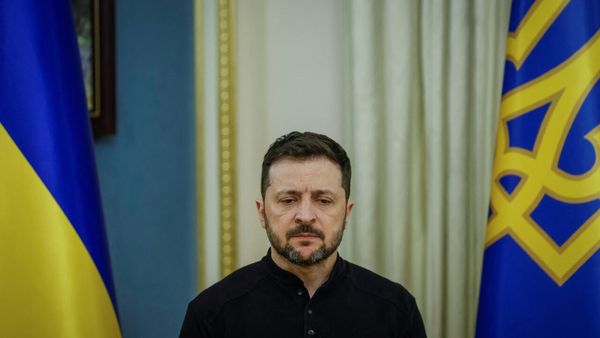
NGOs operating in Haiti warn that the chaos engulfing the country has become so total and the social fabric so torn that the country is on the verge of collapse, as discussions continue at the UN security council on how to restore order.
Haitians are currently facing a series of overlapping crises that are becoming deadlier by the day as heavily armed gangs continue to blockade the country’s principal port and fuel terminal.
The country is also experiencing its worst hunger in history as a deadly outbreak of cholera spreads and armed gangs increasingly targeting women and children with sexual violence as a form of warfare.
“In 20 years of working in Haiti, we have never seen something like this,” said Fiammetta Cappellini, country representative for the Avsi Foundation. “Violence is everywhere and touches everybody. The most vulnerable people are literally struggling to survive as humanitarian aid is failing to reach people.”
On Monday, the US and Mexico called for the formation of a non-UN multinational force to take down the gangs who now dominate much of Port-au-Prince.
Violence has mounted following the assassination of president Jovenel Moïse in July 2021 when the gangs – many of which have links to establishment politicians – exploited a power vacuum to seize more ground.
Now the factions dominating most of Port-au-Prince are using ever more brutal tactics to terrorise the population into submission, the UN’s human rights office said on Friday.
Gang rape of elderly women and girls as young as 10 years old has become a tool “to instil fear, punish, subjugate and inflict pain on local populations,” the UN concluded in its new report.
Among the tens of “gruesome testimonies” collected by the UN there were cases of children being raped for hours in front of their parents and in some cases by more than half a dozen armed men.
“Alarmingly the number of cases increases by the day as the humanitarian and human rights crisis in Haiti deepens,” said Nada Al-Nashif, the acting human rights chief.
Sexual violence is also being used against kidnap victims, the UN said. The organisation documented cases of gangs repeatedly raping women and girls for days or weeks while in captivity. In some cases the gangs send video recordings of the attacks to victims’ families to pressure them into paying for their release.
If not halted imminently the sexual violence will make any chance of reconciliation and peace-building in the country more challenging, the UN said.
“Such rampant use of sexual violence risks further shattering the already deeply fragile social fabric of Haitian society for years to come and may undermine prospects of sustainable development and lasting stability,” the report said.
Already dire hunger levels are also reaching unprecedented, “catastrophic” levels, the World Food Programme (WFP) warned on Friday.
A record 4.7 million people are facing acute hunger, with 1.8 million now at an emergency level of malnutrition.
For the first time thousands of Haitian are suffering level 5 hunger – the WFP’s highest alert level and one often reserved for wartime famine.
Malnutrition has long been rife in Port-au-Prince’s slums, but the paralysis of the country by gangs has caused hunger to reach life-or-death levels.
Many residents are unable to work due to severe petrol shortages and food prices are soaring, leaving 65% of Cite Soleil’s inhabitants regularly hungry and 5% of them needing urgent humanitarian assistance, the WFP says.
As cupboards go bare and water taps run dry, cholera disease has also returned to Haiti with cruel timing.
The bacterial disease can be deadly – particularly for the malnourished – and is probably spreading through Port-au-Prince’s shanty towns with ease, say medical NGOs, as there is little running water for sanitation.
Port-au-Prince’s national penitentiary has become a centre of the outbreak, with 14 deaths recorded in the overcrowded prison.
Haitian health authorities had recorded 425 suspected cases and 22 deaths as of 14 October.
Haiti’s last cholera outbreak began in 2010 and went on to kill 10,000 in the nine years it took to stamp out.
NGOs fear that history will repeat itself if an urgent solution is not found to pacify the violence and end food and water shortages.
“Haitian people can’t wait any longer,” said Judes Jonathas, who manages NGO Mercy Corps’ Haiti programme. “We cannot descend even further into this abyss. The urgency is now, to save what can be saved.”
As the number of victims of disease, malnutrition and gunshot wounds climbs, access to healthcare is shrinking as many hospitals remain closed due to national fuel shortages.
“The population is in an unprecedented and dramatic situation. Now it is really a matter of life or death on a daily basis,” Capellini said.
“The progressive destruction” of Haiti and its institutions will make any program to stabilise then rebuild it from a failed state into a functioning democracy a long and arduous one, said Jonathas.
“There is an absence of a clear policy and of governance at all levels, with all the structures needed to respond to the country’s problems having been weakened,” he said.
Any international solution must also include Haitians if it is to be a lasting one, he added. UN missions in Haiti have quelled violence in the past, but it swiftly returned once they departed.
“Solutions must be local, among Haitians, but of course with the involvement of our international partners. If we talk about solutions and forget once again the important Haitian actors, it will be a short-term solution to return with the same problems a few years later.”







